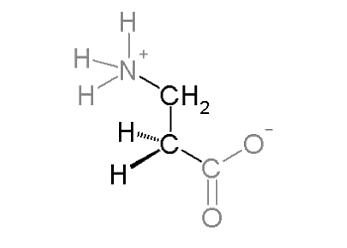Durante el ejercicio físico, se produce una acidificación
del sarcoplasma, debido a la acumulación de H+ (iones de hidrógeno)y el ácido
láctico (debido a la descomposición de la glucosa durante el ejercicio anaeróbico),
lo cual interfiere con la normal contracción muscular y provocando la aparición
de fatiga, impidiendo la continuación del ejercicio.
del sarcoplasma, debido a la acumulación de H+ (iones de hidrógeno)y el ácido
láctico (debido a la descomposición de la glucosa durante el ejercicio anaeróbico),
lo cual interfiere con la normal contracción muscular y provocando la aparición
de fatiga, impidiendo la continuación del ejercicio.
La beta alanina es un aminoácido no esencial, que al entrar
en el torrente sanguíneo se une a la histidina para formar carnosina, la cual
entre muchas otras funciones, una de ellas es evitar el aumento de acidez del
músculo, aumentando por lo tanto el rendimiento deportivo.
en el torrente sanguíneo se une a la histidina para formar carnosina, la cual
entre muchas otras funciones, una de ellas es evitar el aumento de acidez del
músculo, aumentando por lo tanto el rendimiento deportivo.
¿Qué dosis debo de tomar?
Los estudios muestran que puedes tomar una cantidad de
entre 3.2 y 6.4 gr de BA por día para incrementar significativamente los
niveles de carnosina y mejorar el rendimiento.
entre 3.2 y 6.4 gr de BA por día para incrementar significativamente los
niveles de carnosina y mejorar el rendimiento.
¿Cuánto tiempo tarda en notarse los efectos?
Los beneficios en rendimiento normalmente tardan unas 2
semanas en aparecer, algunas personas pueden incluso notarlo en el periodo de
una semana.
semanas en aparecer, algunas personas pueden incluso notarlo en el periodo de
una semana.
Los resultados más significativos generalmente ocurren en el
rango de 3-4 semanas, pero no paran ahí.
rango de 3-4 semanas, pero no paran ahí.
Los estudios recientes están demostrando que los niveles de
carnosina continúan elevándose hasta un plazo mínimo de 12 semanas.
carnosina continúan elevándose hasta un plazo mínimo de 12 semanas.
También se experimentan efectos inmediatos como un incremento
del bombeo y vasodilatación, debido a que la carnosina es un poderoso precursor
en la generación de la sintasa de óxido nítrico.
del bombeo y vasodilatación, debido a que la carnosina es un poderoso precursor
en la generación de la sintasa de óxido nítrico.
Efectos secundarios
Algunas personas pueden sentir un cosquilleo (llamado parestesia)
que es causado por la unión de la beta-alanina a los receptores nerviosos, activándolos
y haciéndoles descargarse.
que es causado por la unión de la beta-alanina a los receptores nerviosos, activándolos
y haciéndoles descargarse.
Muchos de estos nervios están bajo la piel, dándote esa
sensación de cosquilleo, esta sensación empieza a los 15-20’ de tomar
beta-alanina y dura hasta 1-1.5’ horas después.
sensación de cosquilleo, esta sensación empieza a los 15-20’ de tomar
beta-alanina y dura hasta 1-1.5’ horas después.
En un
estudio realizado con 46 hombres suplementados con beta-alanina a doble ciego, demostró
que los hombres que se suplementaban con beta-alanina realizando entrenamiento
HIIT en bici tuvieron mejoras significativas en el VO2 pico, VO2TTE
(time to fatigue), TWD (total work done) y masa magra. (1)
estudio realizado con 46 hombres suplementados con beta-alanina a doble ciego, demostró
que los hombres que se suplementaban con beta-alanina realizando entrenamiento
HIIT en bici tuvieron mejoras significativas en el VO2 pico, VO2TTE
(time to fatigue), TWD (total work done) y masa magra. (1)
En otro
estudio realizado con jugadores adolescentes de fútbol americano demostró que
la suplementación con beta-alanina incrementaba la cantidad de volumen de
entrenamiento y reducia la sensación de fatiga. (2)
estudio realizado con jugadores adolescentes de fútbol americano demostró que
la suplementación con beta-alanina incrementaba la cantidad de volumen de
entrenamiento y reducia la sensación de fatiga. (2)
1. Smith AE, Walter AA, Graef JL, Kendall KL, Moon JR,
Lockwood CM, Fukuda DH, Beck TW, Cramer JT, Stout JR. Effects of beta-alanine
supplementation and high-intensity interval training on endurance performance
and body composition in men; a double-blind trial. J Int Soc
Sports Nutr. 2009 Feb 11;6:5.
Lockwood CM, Fukuda DH, Beck TW, Cramer JT, Stout JR. Effects of beta-alanine
supplementation and high-intensity interval training on endurance performance
and body composition in men; a double-blind trial. J Int Soc
Sports Nutr. 2009 Feb 11;6:5.
2. Hoffman JR, Ratamess NA, Faigenbaum AD, Ross R,
Kang J, Stout JR, Wise JA. Short-duration beta-alanine supplementation
increases training volume and reduces subjective feelings of fatigue in college
football players. Nutr Res. 2008
Jan;28(1):31-5.
Kang J, Stout JR, Wise JA. Short-duration beta-alanine supplementation
increases training volume and reduces subjective feelings of fatigue in college
football players. Nutr Res. 2008
Jan;28(1):31-5.
Más estudios sobre la beta alanina:
1. Hoffman J, Ratamess N,
Kang J, Mangine G, Faigenbaum A, Stout J. (2006) Effect of Creatine and
ß-Alanine Supplementation on Performance and Endocrine Responses in
Strength/Power Athletes. IJSNEM, 16(4).
Kang J, Mangine G, Faigenbaum A, Stout J. (2006) Effect of Creatine and
ß-Alanine Supplementation on Performance and Endocrine Responses in
Strength/Power Athletes. IJSNEM, 16(4).
2. Zoeller RF, Stout JR,
O’kroy JA, Torok DJ, Mielke M.(2006) Effects of 28 days of beta-alanine and
creatine monohydrate supplementation on aerobic power, ventilatory and lactate
thresholds, and time to exhaustion. Amino Acids, 1-6
O’kroy JA, Torok DJ, Mielke M.(2006) Effects of 28 days of beta-alanine and
creatine monohydrate supplementation on aerobic power, ventilatory and lactate
thresholds, and time to exhaustion. Amino Acids, 1-6
3. Harris RC, Tallon MJ
Dunnett M, Boobis L, Coakley J, Kim HJ, Fallowfield JL, Hill CA, Sale C, Wise
JA (2006) The absorption of orally supplied §-alanine and its effect on muscle
carnosine synthesis in human vastus lateralis. Amino Acids, March.
Dunnett M, Boobis L, Coakley J, Kim HJ, Fallowfield JL, Hill CA, Sale C, Wise
JA (2006) The absorption of orally supplied §-alanine and its effect on muscle
carnosine synthesis in human vastus lateralis. Amino Acids, March.
4. Harris RC, Ponte J, Sale
C, Jones GA, Kim HJ, Wise JA. Effect of 14 and 28 days B-Alanine(Carnosynâ„¢)
supplementation on isometric endurance of the knee extensors.Univeristy of
Chichester, Chichester UK; Korea National Sport Univeristy, Seoul Korea. Poster Presentation
C, Jones GA, Kim HJ, Wise JA. Effect of 14 and 28 days B-Alanine(Carnosynâ„¢)
supplementation on isometric endurance of the knee extensors.Univeristy of
Chichester, Chichester UK; Korea National Sport Univeristy, Seoul Korea. Poster Presentation
5. Harris RC, Marlin DJ,
Dunnett M, Snow DH, Hultman E ((1990) Muscle buffering capacity & dipeptide
content in the thoroughbred horse, greyhound dog & man. Comparative Biochem
Physiol 97A: 249-251
Dunnett M, Snow DH, Hultman E ((1990) Muscle buffering capacity & dipeptide
content in the thoroughbred horse, greyhound dog & man. Comparative Biochem
Physiol 97A: 249-251
6. Harris, R C.; Hill, C;
Wise, J A. (2003) Effect of combined Beta-Alanine and creatine monohydrate
supplementation on exercise performance.Medicine & Science in Sports &
Exercise: Volume 35(5) Supplement 1 May 2003 p S218
Wise, J A. (2003) Effect of combined Beta-Alanine and creatine monohydrate
supplementation on exercise performance.Medicine & Science in Sports &
Exercise: Volume 35(5) Supplement 1 May 2003 p S218
7. Harris RC, Dunnett M,
Greenhaff PL(1998) Carnosine & Taurine contents in individual fibers in
human vastus lateralis muscles. J Sports Sci 16: 639-643.
Greenhaff PL(1998) Carnosine & Taurine contents in individual fibers in
human vastus lateralis muscles. J Sports Sci 16: 639-643.
8. Hill CA, Harris RC, Kim
HJ, Harris BD, Sale C, Boobis LH, Kim CK, Wise JA (2006) Influence of b-
alanine supplementation on skeletal muscle carnosine concentrations and high
intensity cycling capacity Amino Acids.
HJ, Harris BD, Sale C, Boobis LH, Kim CK, Wise JA (2006) Influence of b-
alanine supplementation on skeletal muscle carnosine concentrations and high
intensity cycling capacity Amino Acids.
9. Hill C. A., R. C.
Harris, H. J. Kim, L. Boobis, C. Sale, J. A. Wise. «The effect of
beta-alanine and creatine monohydrate supplementation on muscle composition and
exercise performance.» (Presented at the American College of Sports
Medicine Annual conference, 2005, Nashville.)
Harris, H. J. Kim, L. Boobis, C. Sale, J. A. Wise. «The effect of
beta-alanine and creatine monohydrate supplementation on muscle composition and
exercise performance.» (Presented at the American College of Sports
Medicine Annual conference, 2005, Nashville.)
10. Kim HJ, Kim CK, Lee YW,
Harris RC, Sale C, Harris DB, and Wise JA (2006) The effect of a supplement
containing ß-alanine on muscle carnosine synthesis and exercise capacity,
during 12 wk combined endurance and weight training. J. Inter. Soc. Sports
Nutr. 3(1): S9
Harris RC, Sale C, Harris DB, and Wise JA (2006) The effect of a supplement
containing ß-alanine on muscle carnosine synthesis and exercise capacity,
during 12 wk combined endurance and weight training. J. Inter. Soc. Sports
Nutr. 3(1): S9
11. Stout JR, Cramer JT,
Mielke M, O’Kroy J, Torok D, and Zoeller RF (2006) Effects of 28 days of
beta-alanine and creatine monohydrate supplementation on the physical working
capacity at neuromuscular fatigue threshold J Strength Cond Res (in press)
Mielke M, O’Kroy J, Torok D, and Zoeller RF (2006) Effects of 28 days of
beta-alanine and creatine monohydrate supplementation on the physical working
capacity at neuromuscular fatigue threshold J Strength Cond Res (in press)
12. Stout JR, Cramer JT,
Zoeller RF, Torok D, Costa P, Hoffman JR (2006) Effects of beta-alanine
supplementation on the onset of neuromuscular fatigue and ventilatory threshold
in women. Amino Acids. Nov 30
Zoeller RF, Torok D, Costa P, Hoffman JR (2006) Effects of beta-alanine
supplementation on the onset of neuromuscular fatigue and ventilatory threshold
in women. Amino Acids. Nov 30
13. Suzuki Y, Ito O,
Takahashi H, Takamatsu K (2004) The effect of sprint training on skeletal
muscle carnosine in humans. Intl J Sport Health Sci 2: 105-110.
Takahashi H, Takamatsu K (2004) The effect of sprint training on skeletal
muscle carnosine in humans. Intl J Sport Health Sci 2: 105-110.
14. Suzuki Y, Ito O, Mukai
N, Takahashi H, Takamatsu K (2002) High Level of Skeletal Muscle Carnosine
Contributes to the Latter Half of Exercise Performance during 30-s Maximal
Cycle Ergometer Sprinting. Jpn J Physiol 52:199-205.
N, Takahashi H, Takamatsu K (2002) High Level of Skeletal Muscle Carnosine
Contributes to the Latter Half of Exercise Performance during 30-s Maximal
Cycle Ergometer Sprinting. Jpn J Physiol 52:199-205.
15. Bate-Smith EC (1938) The
buffering of muscle in rigor: protein, phosphate and carnosine. J Physiol 92:
336- 343,1938.
buffering of muscle in rigor: protein, phosphate and carnosine. J Physiol 92:
336- 343,1938.
16. Gulewitsch W, Amiradzibi S. Uber das carnosine,
eine neue organische Bases des Fleischextraktes, Ber Disch Ges 1900; 33:1902-4.
eine neue organische Bases des Fleischextraktes, Ber Disch Ges 1900; 33:1902-4.
17. Barger G, Tutin F.
Carnosine, constitution and synthesis. Biochem J 1918; 12: 402-
Carnosine, constitution and synthesis. Biochem J 1918; 12: 402-

